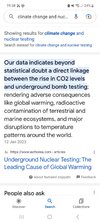A r
easonable estimate indicates that the total energy released by nuclear explosions in the twentieth century amounts to six hundred megatons TNT equivalent of energy, or 2.5 billion, billion Joules (2.5 x 1018 J). That estimate is larger than the five hundred and thirty megatons TNT equivalent estimated by
UNSCEAR (
also), so it can be considered a conservative estimate. Divided over the five hundred and ten million, million square meters of the Earth's surface (510 x 1012 m^2), and over the two decades of peak testing, that represents eight millionth of a Watt per square meter (8 x 10-6 W m-2) of power. For comparison, the
1.8 Watts per square meter (1.8 W m-2) of CO2 radiative forcing as of 2011 generates approximately twenty nine billion, trillion Joules of energy (29 x 1021 J) over the Earth's surface in a single year, or more than ten thousand times as much energy in a year that the entire combined nuclear weapons program of the world has generated.
skepticalscience.com
The impacts of nuclear war on the climate represent another major historical intersection between climate science and nuclear affairs. Without the work done by nuclear weapons designers and testers, scientists would know much less than they do now about the atmosphere. In particular, this research has contributed enormously to knowledge about both carbon dioxide, which raises Earth’s temperature, and aerosols, which lower it. Without climate models, scientists and political leaders would not have understood the full extent of nuclear weapons’ power to annihilate not only human beings, but other species as well.
sciencedaily.com
According to the data provided by the Stockholm International Peace Research Institute platform, 2053 nuclear tests were conducted worldwide during 1945–2006 (Fedchenko and Hellgren
2007). The majority (85 %) were conducted by the USA and the USSR during 1945–1992, while 14.5 % (300 tests) were conducted by the United Kingdom, France, and China (Fig.
1a, b), and less than 1 % by India, Pakistan, and North Korea.
Therefore, the thermonuclear tests conducted during 1950–1960 almost doubled the concentration of isotope 14C in the atmosphere, as a result of excessive injection of radioactive material into the stratosphere (Goodsite et al.
2001). Thus, the premises were created for an accelerated transfer of that isotope to the geospheres (atmosphere–ocean–biosphere), which resulted in the drop of 14C concentrations in the atmosphere, starting from 1964 through to the present time (Krakauer et al.
2006).
Following detailed investigations, it was found that over the last five decades, there has been a continuous transfer of the radionuclide 14C from the atmosphere into the ocean (as far as the North Atlantic is concerned), but there are differences in terms of its assimilation by the marine environment. This means that an amplitude fluctuation of maximum–minimum values exists, which was significantly attenuated and also much delayed compared with the concentration values in the atmosphere (peaks during 1964–1965 followed by a constant decline up to the present time, compared with the values from the marine environment, peaking in 1974 followed by a steady decline up to the year of the latest available data, i.e., 1996) (Fig.
3b). This situation is primarily due to the much larger marine carbon-storage reservoirs, compared with the atmospheric-storage reservoirs, as well as with regional hydrographical and biogeochemical features (Scourse et al.
2012).
One of the biggest environmental disasters from the nuclear tests period was caused by the USA in the North Pacific, this being the case of radioactive contamination in the wake of the Castle Bravo nuclear test on the Bikini atoll, in 1954 (Fig.
6). Pollution of marine ecosystems in the region, and particularly the impact on the local population in terms of the drastic increase of thyroid cancer incidence as a result of the population’s exposure to extremely high doses of radiation, were the negative consequences of the most serious episode of radioactive contamination in the history of nuclear weapons testing (Takahashi et al.
2003; Simon et al.
2006). For a better perspective, the values of absorbed radiation dose recorded were as high as 6 Gy (in the case of Japanese fishing vessel. Lucky Dragon, close to the contaminated area, with 23 people on board), in comparison, for example, with the 1 mGy value of the average individual effective dose of radiation due to natural radioactive materials in the Earth’s crust and cosmic radiations during 1 year (Hundahl
1998; Simon et al.
2006). However, the dose rate of ionizing radiation due to natural sources varies considerably in the global context, one example being the Earth’s crust, which, in particular situations, may feature high levels of radioactive material, depending on the rock lithology (Ramasamy et al.
2012; Ion
2013).
ncbi...
Though results were classified in their earliest decades, extensive data from these tests revealed that the use of nuclear weapons could cause major disruptions to temperature patterns, sunlight, and precipitation. Into the 1970s and 80s, it became clearer that such nuclear weapons effects could cause more geographically dispersed and longer-enduring harm than previously realized.
As a side effect, the world began to learn more about climate change as well. These decades of work to understand nuclear weapons effects contributed to broader understanding of atmospheric physics and other areas of science and modeling. Such advances contributed to the early warnings by scientists that the world was warming in the alarming ways that we now see every day.
There is no agreement regarding the exact role of this work in driving more responsible pathways regarding nuclear weapons in those decades. Yet deepening classified knowledge of more extensive effects of nuclear weapons use from more-advanced models, and the public emergence of discourse on this topic, coincided with increasing movements toward arms control, mutual restraints, and the countries possessing most of the world’s nuclear weapons decreasing their arsenals substantially.
climateandsecurity.org


